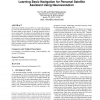Free Online Productivity Tools
i2Speak
i2Symbol
i2OCR
iTex2Img
iWeb2Print
iWeb2Shot
i2Type
iPdf2Split
iPdf2Merge
i2Bopomofo
i2Arabic
i2Style
i2Image
i2PDF
iLatex2Rtf
Sci2ools
GECCO
2005
Springer
2005
Springer
Learning basic navigation for personal satellite assistant using neuroevolution
The Personal Satellite Assistant (PSA) is a small robot proposed by NASA to assist astronauts who are living and working aboard the space shuttle or space station. To help the astronaut, it has to move around safely. Navigation is made difficult by the arrangement of thrusters. Only forward and leftward thrust is available and rotation will introduce translation. This paper shows how stable navigation can be achieved through neuroevolution in three basic navigation tasks: (1) Stopping autorotation, (2) Turning 90 degrees, and (3) Moving forward to a position. The results show that it is possible to learn to control the PSA stably and efficiently through neuroevolution. Categories and Subject Descriptors I.2.6-Learning; I.2.8-Problem Solving, Control Methods, and Search; I.2.9-Robotics General Terms Algorithms, Experimentation, Performance Keywords Neuroevolution, Enforced Sub-Populations, PSA
Basic Navigation Tasks | GECCO 2005 | Performance Keywords Neuroevolution | Personal Satellite Assistant |
| Added | 27 Jun 2010 |
| Updated | 27 Jun 2010 |
| Type | Conference |
| Year | 2005 |
| Where | GECCO |
| Authors | Yiu-Fai Sit, Risto Miikkulainen |
Comments (0)

